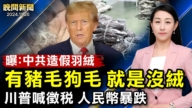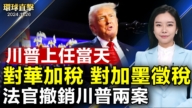【新唐人2011年6月16日讯】中国与越南和菲律宾关系,因南海主权问题进一步紧张,中共依然强调与当事国通过双边谈判解决争端。不过东南亚国家倾向于通过东盟10国多边机制展开谈判,让多边会谈能为美国的参与打开大门。
6月13号,美国国会参议员韦伯说,他正在推出决议,呼吁中国在南中国海停止军事行动,以多边方式谈判解决问题。中共外交部发言人洪磊星期二(6月14日)被问到如何回应这一决议案,和以多边方式解决领土纠纷时,不点名的表示了不希望美国介入,
洪磊:“我们希望南海争议的非当事国,切实尊重当事国通过直接谈判解决争议的努力。”
不过,随着最近南海主权冲突事件变得越来越频繁,导致多数身为“当事国”的东南亚国家,纷纷敦促美国继续参与东南亚事务。就目前的纷争,越南已经表示:欢迎一切为维护南海海域和平与稳定的国际社会的努力。
其他东南亚国家也倾向于通过东盟10国多边机制展开谈判,因为多边会谈能为美国的参与打开大门。
南海是世界上最繁忙的海上通道之一,且蕴藏有丰富的资源。近年来随着冲突事件频繁发生,东南亚国家对中共在这海域行动的抨击声音也愈发响亮。这次纠纷被法国媒体形容为“南海突然发烧”,纠纷的源头,是5月末,中国船只在越南经济特区内,割断在海域作业的越南石油勘测船的勘探缆线;菲律宾抗议中共在安塘滩(Amy Douglas Bank)竖立柱子、设置浮标和留置建筑材料等等。
中共为什么在目前突然采取引发冲突的一些行为呢?评论员李天笑认为,背后有深刻的原因。
李天笑:“现在中国国内的群体抗暴事件风起云涌,因此中共感到非常恐惧,就要用在国外的事件转移视线,南海就成为了一个重要的棋子。再有一个就是石油,石油一直是中共所需要的,是为了支撑他的经济GDP的发展,给他政权打上一个光环,它要用经济上的发展,来支撑他的所谓的执政合法性,那么在这种情况下,石油就成了一个非常关键的因素。”
《路透社》的分析文章说,东南亚各国无法挑战中国的军力,但也不甘于就此屈服,丧失接近南海海岸线的领土。将这个争端国际化,包括鼓励美军在这海域的存在,不失为保护这些国家利益的一个办法。
不过,中共对越南星期一举行的海上实弹演习却做出了比较温和的评论,只表示北京希望各方为地区的和平和稳定做出更多努力。另外,中共也对另一个南海争端国家--菲律宾总统发出访华邀请。有评论认为,这显示了中共向各国表示和平与外交解决争端的信息。但也有一些国际评论认为,中国正在通过向菲律宾示好而孤立越南,从而达到各个击破分而治之的战略。
美国并没有直接介入南中国海的领土争议,但美国官员表示保护这个地区的航海自由符合华盛顿的利益。去年秋季,美国国务卿希拉里.克林顿曾呼吁中国和东盟国家举行多边谈判,美国毛燧自荐希望充当多边谈判的调停人。而这正是中共所绝对不愿意。
因此,虽然中共驻菲律宾大使刘建超日前表示,中国愿搁置争议,展开合作。不过,连如何展开谈判本身都是个问题,因为中共坚持双边,而东南亚国家倾向多边。而合作更是遥遥无期的话题了。
新唐人记者尚燕、朱娣综合报导。
South China Sea Dispute
South China Sea sovereignty issue has intensified
the relations between China, Vietnam and Philippines.
Chinese authorities (CCP) insists on bilateral talks
with other interested parties to solve the problem.
Yet, Southeast Asian states opt for multi-lateral talks
and they welcome the participation of the U.S.
On June 13, U.S. Senator Weber called on China
to stop its military actions in the South China Sea and
to use multi-lateral talks to resolve the issue instead.
CCP Foreign Ministry spokesman Hong Lei
made implicit dissent against U.S. participation
when asked to respond to Weber’s proposal, on June 14.
Hong: We hope that countries that are not parties to
the dispute respect the efforts of the parties concerned
to resolve disputes through consultation.
As conflicts involving South Sea sovereignty increase,
the majority of Southeast Asian countries,
which are parties concerned, urge U.S. to participate.
Vietnam declared to welcome all global efforts to
help maintain peace and stability of South China Sea.
Other Southeast Asian nations favor multilateral talks,
which can open doors for the U.S. participation.
South China Sea has many busy shipping routes.
It is also rich in natural resource deposits.
In recent years, with frequent clashes with other states,
CCP has been denounced for its moves in the region.
French media calls it a “sudden fever of South Sea”.
The dispute was triggered by an incident in late May.
Chinese ships cut off cables of Vietnamese vessels
in the Vietnamese economic special zone.
Also, the Philippines objected to CCP’s establishing
buoy marks and leaving construction materials
on Amy Douglas Bank.
Critic Li Tianxiao says there are underlying reasons
to the conflicts triggered by CCP’s sudden actions.
Li Tianxiao: CCP schemed to cause a diversion
from the recent growing domestic high-profile riots.
So, the dispute became an important pawn in its game.
Furthermore, as oil is vital to CCP’s GDP growth,
which supports the legality of CCP’s rule,
oil has become a key element.
Reuters analyzed, despite lack of military power,
Southeast Asian countries refuse to submit to China
and yield their territories bordering South China Sea.
Internationalizing the dispute can encourage
the presence of the U.S. military in the region,
so their interests will not be compromised easily.
However, CCP commented moderately on
Vietnam’s missile exercise in South Sea on Monday,
saying that Beijing hopes all parties to strive for peace.
CCP has also invited the Pilipino president for a visit.
Some commentators regard it as a sign of CCP’s
use of diplomacy to resolve the issue.
Others regard it as CCP’s isolation of Vietnam
by seeking an alliance with the Philippines,
to the aim of crushing them both, one by one.
The U.S. hasn’t directly intervened in the dispute.
However, officials say that it’s in the U.S. interests
to protect the freedom of navigation in this region.
In last fall, U.S. States Secretary Hilary Clinton
appealed to China to take part in ASEAN talks.
The U.S. volunteered to serve as a conciliator,
which was against the CCP’s wishes.
Liu Jianchao, the CCP ambassador to the Philippines,
said China wishes to put the dispute aside
and start cooperation with other nations.
However, the talks are problematic to start,
as CCP’s insists on bilateral talks, whereas
other Southeast Asian nations favor multi-lateral talks.
NTD reporters Shang Yan and Zhu Di




























